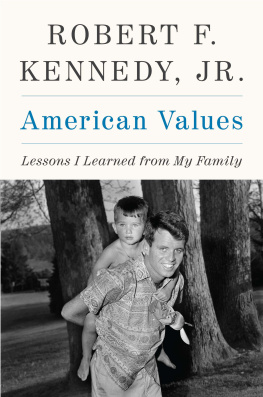First published 2014 by Transaction Publishers
Published 2017 by Routledge
2 Park Square, Milton Park, Abingdon, Oxon OX14 4RN
711 Third Avenue, New York, NY 10017, USA
Routledge is an imprint of the Taylor & Francis Group, an informa business
Copyright 2014 by Taylor & Francis.
All rights reserved. No part of this book may be reprinted or reproduced or utilised in any form or by any electronic, mechanical, or other means, now known or hereafter invented, including photocopying and recording, or in any information storage or retrieval system, without permission in writing from the publishers.
Notice:
Product or corporate names may be trademarks or registered trademarks, and are used only for identification and explanation without intent to infringe.
Library of Congress Catalog Number: 2013038881
Library of Congress Cataloging-in-Publication Data
Neal, Arthur G.
Core values in American life : living with contradictions / Arthur G. Neal and Helen Youngelson-Neal.
pages cm
ISBN 978-1-4128-5394-1
1. Social values--United States. 2. Values--United States. 3. United States--Moral conditions. 4. United States-- Civilization. I. Youngelson-Neal, Helen. II. Title.
HN90.M6N43 2014
303.372--dc23
2013038881
ISBN 13: 978-1-4128-5394-1 (hbk)
Values shape what men and women see as important in life, how priorities are to be established, and how they create their own places within a given historical context. It is the intensity of commitment to a set of values that provides sources of meaning in what otherwise would be a drab and mundane world. This intensity ranges along a continuum from the vigor and fervor of true believers to only qualified confidence in their own beliefs and commitments. To some, values are at the center of self-identities.
There are several criteria we have drawn upon in our selection of the core values for our analysis. One of these is their prominence in the formal documents that Americans have drawn upon in the shaping of their historical destiny (Dershowitz, 2004). For example, the values of individualism, the pursuit of happiness, freedom, and equality were noteworthy in the Declaration of Independence and the US Constitution. The rights and privileges prominently emphasized in the Constitution were designed to place limits on what our government could or could not do. The equality of opportunity is formally inscribed on the Statue of Liberty and also a prominent part of the value system of Americans.
The core values of American life are deeply embedded in historical experiences and traditions (Shils, 1981). All modern nations are required to create and maintain their society as a moral community. It is through deployment of the many aspects of their core values that they are able to achieve this purpose. The values that are drawn upon in this process do not endure for very long without modifications. Each generation finds it necessary to take the data from the past and rework it to fit the needs of their time and place.
Other core values were selected as a result of the extensiveness with which they are held in the general population and for the direction in which society is moving. For example, the importance of intimate relationships is primarily emphasized in individual hopes and aspirations for having a good marriage. Other prominent values include consumerism, materialism, and technology. These beliefs and values are clearly evident in lifestyles that continue to be accentuated with the passing of time. No claims are made for the exclusiveness of the values selected. Other investigators may very well select and focus on other values.
In the first half of the nineteenth century, sociologists were observing the impact of the radio and the automobile on American life. In this context, William F. Ogburn (1922) developed the cultural lag hypothesis. This hypothesis held that technology was advancing very rapidly, while social institutions were changing slowly. In the long run, he maintained, social institutions would be required to make changes appropriate for the technology that was being elaborated. Ogburn referred to the time required for this adaptation as a cultural lag.
In recent years there have been spectacular accomplishments in technology. We have split the atom, landed a man on the moon, travelled faster than the speed of sound, eliminated small pox on a worldwide basis, and developed satellite communication. The development of computers and other forms of communication technology have revolutionized information processing and interpersonal communication. These stunning developments have a high degree of visibility and perhaps contribute more than anything else to the accelerating changes in the modern world.
The materialism of Americans is reflected in their emphasis on making a lot of money. Forbes (March 2013) reported that of the 1,426 billionaires in the world. There were 442 billionaires in the United States, an increase of seventeen over the prior year of 2012. This is symptomatic of the increasing concentrations of wealth in the United States. Surveys in recent years have clearly indicated that the major reasons for attending college are career development and having a high lifetime income. Americans are building and buying large houses and assuming that their happiness will increase with increasing incomes. Among married couples in the United States, an emphasis is placed on having dual careers.
Values related to materialistic lifestyles consist of the enduring attitudes of Americans to the environment. Mastery and control over the physical environment is closely linked with American concerns with practicality, efficiency, and profitability. For example, the concern with better methods in coal mining led to developing techniques for mountain top removal. The removal of immense amounts of natural gas can be achieved through the use of fracking. This is a procedure for drilling deep holes into the ground and filling them with vast amounts of explosive chemicals.
The contradictions inherent in the emphasis on mastery of the environment has been made evident by environmental activists, who are concerned with irreparable damage to the environment, with preserving scarce resources for the benefit of future generations, and with maintaining an environment that is sustainable. The business emphasis on growth, development, and profitability stands in contrast to the notion of collectively developing a custodial approach to the environment.
The growth of consumerism in the United States in the postWorld War II years was a result of the pent-up demand from wartime rationing. After the war production was shifted to the manufacture of consumer goods. Advertising played an important part in generating a demand for the products of modern industry. Easy credit and the availability of credit cards made it simple to buy now and pay later. Data from the Bureau of Economic Analysis, Department of Commerce (December 20, 2013) indicated that 69 percent of the GDP (gross domestic product) consisted of consumer spending. Consumer confidence and consumer purchases make a definitive contribution to the viability and growth of the American economy.











